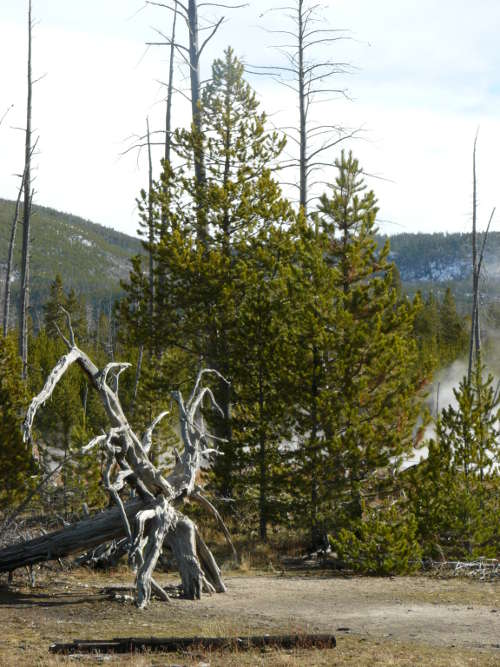 Location Taken: Yellowstone National Park, Wyoming
Location Taken: Yellowstone National Park, Wyoming
Time Taken: October 2012
A few days ago, I mentioned that pine trees tend to have shallow roots.
Well, here’s an example.
Now, it might just be a quirk of the particular spot this tree grew on, but that root system would have barely scratched the surface of the planet. And yet, judging from the thickness of the trunk, it grew quite well.
There are some disadvantages to being able to root yourself in shallow and otherwise difficult spots, and they’re actually nicely illustrated here.
For one thing, shallow roots means you’re far more prone to tip over. If you’ve seen deeper-rooted trees that managed to tip over, you may recall just how much dirt they dragged with them. But there’s not even a pile at the bottom of these roots. There just wasn’t anything holding this tree in place once things got tough.
And speaking of tough, the reason this tree died was a forest fire that passed through several decades before I took this photo. You may notice the large number of dead pine trees in the area, and a nice grove of shorter, younger trees around them.
Deeper-rooted trees can ride out forest fires in a properly managed area. The deep roots don’t even notice the heat, so the tree rarely fully dies from even the worst fire (though it does severely damage them, which does mean a lot will die shortly after), and hardwood trees especially have a lot of anti-fire systems built in to their bark.
Shallow-rooted trees, however, have their whole system baked. Rather than give up the advantages of shallow roots, they tend to go for long lasting seeds that ride through fire just fine. Hence, the odd shape of the pinecone. There’s even a few pine species that require fire to open up the hard shell of their cones. What this means, though, is that while the parent trees die off, their children survive and even thrive. There’s little competition for sunlight, and the fast-growing pines with their fire-happy seeds can quickly claim all the burned off land, forming a new forest on the bones of the last.
